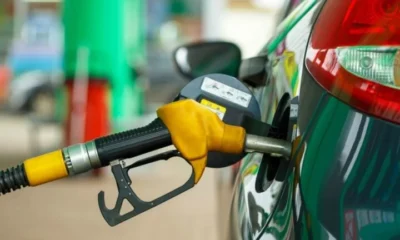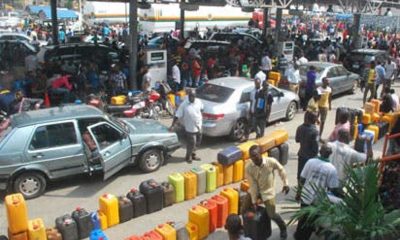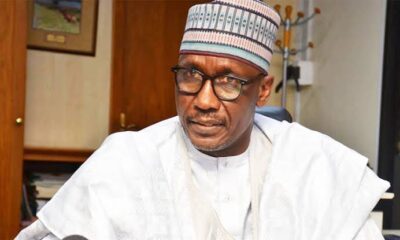Opinion
Subsidy removal: A ‘mixed bag’ for Nigerians

The removal of fuel subsidy in Nigeria has been a hotly debated topic for months. From Nigerians who believe it is the right step and others who feel it is the appropriate step at the wrong time with a wrong approach, everyone virtually has input on this.
On May 29, 2023, during the inauguration ceremony, President Bola Tinubu announced that the fuel subsidy would be scrapped, with immediate effect. This decision was met with mixed reactions from Nigerians, with some praising the government for taking a bold step and others criticizing the move as being harmful to the poor.
In the real sense of it, the removal of fuel subsidy would free up billions of Naira in government spending. This money can now be used to fund other important projects, such as education, healthcare, and infrastructural development. But would this be effective in Nigeria with her corrupt leaders?
The removal of fuel subsidy would make Nigeria’s fuel prices more competitive with those in other countries. This could lead to increased investment and economic growth if properly managed.
But on the other hand, the removal of fuel subsidy will also have some negative consequences. The most immediate impact has been an increase in the price of fuel. This has put a strain on the budgets of ordinary Nigerians, who are already struggling with high inflation. Additionally, the removal of fuel subsidy has led to increased smuggling of fuel across Nigeria’s borders. This has further eroded government revenue and has made it difficult to control fuel prices.
Taking a careful introspection at the situation on ground, the removal of fuel subsidy is a complex issue with no easy answers. There are both pros and cons to the policy. Ultimately, it is up to the Nigerian government and people to decide whether the benefits of removing fuel subsidy outweigh the costs.
From observation, there are a few potential benefits to removing the fuel subsidy. For example, fuel subsidy removal could help reduce corruption. The previous fuel subsidy regime is highly opaque and there is a lot of evidence that it is being used to enrich corrupt individuals. Removing the subsidy would make it more difficult for this to happen.
Moreover, removing the fuel subsidy could encourage investment in the oil and gas sector. The previous subsidy regime made it difficult for private companies to compete with the government-owned Nigerian National Petroleum Corporation (NNPC). Removing the subsidy would create a more level playing field and could attract more investment into the sector.
Way forward
The Nigerian government can do several things to mitigate the negative impact of fuel subsidy removal.
Firstly, the government can provide targeted palliative to the most vulnerable Nigerians. This would help to ensure that the poorest Nigerians are not disproportionately affected by the price increase. Though this might create more means for corrupt leaders to embezzle funds, if truly the fuel subsidy removal aims to improve the economy of Nigeria, our leaders should prioritize this and make sure it goes beyond words and becomes a reality.
Also, the government can invest in public transportation. This would make it easier for Nigerians to get around without relying on their cars and having to pay exuberant transport fares.
Another area the government must consider is increasing the minimum wage, or providing other forms of social assistance to ease the effects on the citizens. The government should also provide an option for workers to work from home on alternate days in some sectors.
The government should also cut costs on their allowance and official budget. Recently, it was reported that Senators spend N40 billion on SUVs. This is unnecessary and the cost of obtaining these vehicles can be used for better economic development.
Lastly, the government can improve the efficiency of its tax collection system when minimum wage and economic development have been put in place. This would help to generate more revenue, which could be used to offset the cost of fuel subsidy removal.
The removal of the fuel subsidy is a major policy change that will have a significant impact on Nigeria. The government will need to carefully consider the pros and cons of this decision and take steps to mitigate the negative impact.
Role of Nigerians
This is a sudden reality Nigerians are facing and like the social media slang, “shege promax” is hitting everyone hard.
There are some things Nigerians can put to good use to reduce the effects of subsidy removal.
First and foremost, Nigerians can conserve fuel by driving less and walking more. This is a sad reality, and it might not be convenient for everyone, but as much as possible, walk short distances. When you need to go on a trip, weigh the cost, if it is not an emergency, cancel the trip to save the cost of transport fare.
Secondly, Nigerians can switch to more fuel-efficient vehicles. This will support policies that promote renewable energy, and it would help reduce Nigeria’s reliance on imported oil and would make fuel prices more stable eventually.
Going forward, Nigerians, as a matter of necessity, must have a budget and avoid unnecessary spending. Nigerians should avoid every impulsive buying that would have a pull on their finances as the inflation rate is on the high side and might not get better soon.
The removal of fuel subsidy is a major policy change that will have a significant impact on Nigeria. The government and the people need to work together to mitigate the negative impact of the policy and to ensure that the benefits are shared by all Nigerians, not politicians or people in executive offices alone.
The government needs to see how the country will adjust to this change and help citizens not to break down mentally from the sudden hike in place. However, if the government and the people can take steps to mitigate the negative effects of the subsidy removal, then it could be a positive step for the Nigerian economy eventually.
- Dr Zainab Sulaiman, an Advisory Board Member at Generation Democracy writes from Abuja
Send Us A Press Statement Advertise With Us Contact Us
And For More Nigerian News Visit GWG.NG














